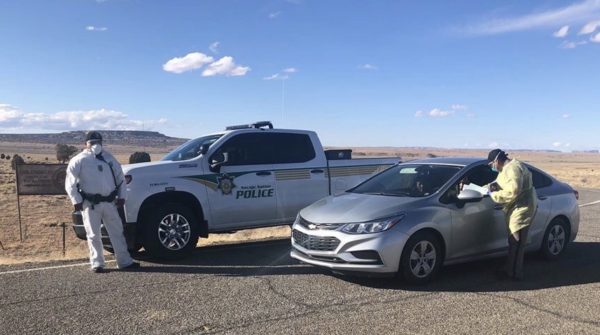
- Details
- By Press Releases
From Press Release
WINDOW ROCK, Ariz. —Navajo Nation President Jonathan Nez and Vice President Myron Lizer were informed by the Navajo Department of Health and Navajo Area Indian Health Service on Saturday, that the number of positive tests for COVID-19 has reached a total of 26 for residents of the Navajo Nation.
This includes 18 cases from the Kayenta Service Unit, four from the Chinle Service Unit, three from the Tuba City Service Unit, and one from the Crownpoint Service Unit. As of Saturday, there are no confirmed deaths related to COVID-19 for residents of the Navajo Nation.
A Public Health Emergency “Stay at Home Order” is now in effect requiring all residents of the Navajo Nation to remain home and isolated and all non-essential businesses to close to prevent the further spread of the COVID-19 coronavirus. The previous shelter-in-place order for the community of Chilchinbeto in now expanded to the entire Navajo Nation.
“Everyone needs to stay home, that’s how we will start to beat this virus. To prevent a massive health crisis, every person must remain home. We know some may need food, medicine, or other essential items, but beyond that we shouldn’t have anyone traveling or going out into the public. This includes public gatherings and meetings,” said President Nez.
In a short period of time, COVID-19 has arrived on the Navajo Nation and the number of cases reached 26 on March 21. While joint tribal and IHS epidemiologist teams are working to stop the virus’s spread, the degree of contact of contagious individuals and the subsequent degree of exposure is unknown. According to the “Stay In Place” Order, continued person-to-person spread throughout the Navajo Nation poses an extensive and substantial public health risk,.
“There are people who are testing negative for COVID-19 and that is good news, but there are still many more tests that the Navajo Department of Health and the Navajo Area IHS are waiting for results and confirmation,” President Nez added.
The order also outlines provisions for “essential activities, essential businesses, and any work necessary to the operations and maintenance of essential infrastructure.” It further states that Navajo Nation citizens are required to stay home and undertake only those outings absolutely necessary for their health, safety, or welfare as described in the Order.
“Stay home, stay safe, save lives! That’s the message we are sending out to the Navajo Nation to protect our communities from further spread of COVID-19. Every day, we are praying for our people who are sick and their families. We are also praying for our people, the brave first responders, and everyone else on the front line,” stated Vice President Lizer.

On Saturday, first responders began delivering care packages to residents of Chilchinbeto. Additional resources including coal, firewood, water, and other essential items are also arriving for local residents including the elderly and high-risk. “We want to let the Navajo Nation that we are here to help our Nation get through this time. We stand with you every step of the way. We will overcome this virus,” President Nez said.
In support of the order, the Navajo Police Department established community checkpoints to limit and inform travelers to stay home and discourage unnecessary traveling. Checkpoints have been established near the Chilchinbito area.
On Friday, President Nez and Vice President Lizer also approved a $4 million appropriation for the Navajo Department of Health to fight the spread of the COVID-19 pandemic on the Navajo Nation and deliver much-needed resources and equipment to health care experts and emergency response personnel on the ground. The funding will provide medical supplies, food and water supplies, equipment, public outreach, and more.
More Stories Like This
Native News Weekly (August 25, 2024): D.C. BriefsUS Presidents in Their Own Words Concerning American Indians
Two Murdered on Colville Indian Reservation
NDAA passes House; Lumbee Fairness Act Advances
NFL, Vikings to Host Native All-American Game, Youth Flag Clinic
Help us defend tribal sovereignty.
At Native News Online, our mission is rooted in telling the stories that strengthen sovereignty and uplift Indigenous voices — not just at year’s end, but every single day.
Because of your generosity last year, we were able to keep our reporters on the ground in tribal communities, at national gatherings and in the halls of Congress — covering the issues that matter most to Indian Country: sovereignty, culture, education, health and economic opportunity.
That support sustained us through a tough year in 2025. Now, as we look to the year ahead, we need your help right now to ensure warrior journalism remains strong — reporting that defends tribal sovereignty, amplifies Native truth, and holds power accountable.
 The stakes couldn't be higher. Your support keeps Native voices heard, Native stories told and Native sovereignty defended.
The stakes couldn't be higher. Your support keeps Native voices heard, Native stories told and Native sovereignty defended.
Stand with Warrior Journalism today.
Levi Rickert (Potawatomi), Editor & Publisher
